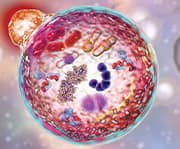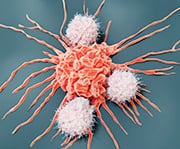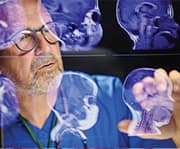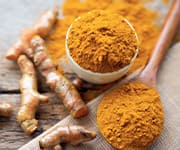Life Extension Magazine.
To keep a car running smoothly we regularly change the oil, replace worn parts like spark plugs and brake pads, and perform other basic maintenance tasks.
Our cells work much the same way.
As we age our cells accumulate damaged proteins and other toxic debris. This leads to accelerated degenerative processes, and risk for chronic disorders.
A natural housekeeping process called autophagy functions as a built-in cleansing service whereby damaged cellular components are identified and eliminated.1-3
The vital autophagy process declines with age.1,3,4
Curcumin, a compound found in the spice turmeric, has been shown to boost autophagy.5-11 Preclinical and clinical studies have shown that it can help combat several key factors involved with degenerative aging.
Importance of Autophagy
The body has a natural way to detect, clean and recycle the cellular damage that accumulates over time.1-4 This process, called autophagy, enables cells to clean up their metabolic waste.
Autophagy literally translates to “self-eating.” In this process, cells devour and break down old, worn-out internal components to make room for fresh, new replacements.
This helps enable cells to continue functioning optimally.
Aging and poor diet lower the rate of autophagy. As it slows down, metabolic waste accumulates inside cells and compromises optimal functions.
Cell and animal studies show that when autophagy is deficient, organisms suffer premature aging, chronic disease, and shortened lifespan.1,4 In several animal studies, when autophagy is enhanced, longevity is increased.12-15
For example, in one study, activating autophagy in mice extended the average lifespan by 17.2%.15
Ways to Stimulate Autophagy
Research has indicated that physical exercise16 and intermittent fasting or calorie restriction17 stimulate autophagy.
Metabolic abnormalities contribute to chronic diseases. The enzymes mTOR and AMPK play a key role in modulating cellular autophagy.1,4
When calorie intake is high, mTOR is activated and shuts off autophagy, whereas inhibiting excess mTOR activity can increase autophagy.18
AMPK activates autophagy. Increased cellular AMPK activity has been shown to improve metabolic health and longevity.1
When AMPK is increased and mTOR is decreased, autophagy is most active.1,4
As we age, the autophagy process can become impaired or diminished, leading to catastrophic results. Most age-related chronic diseases, from cardio-vascular to neurodegenerative disorders and cancer, have been linked to diminished autophagy.1,4
A decline in autophagy leads to metabolic conditions, which further impair autophagy, creating a vicious cycle that advances aging.1
Autophagy
A lysosome (orange) fusing with an autophagosome (large sphere). Autophagy is the natural mechanism that destroys unnecessary or dysfunctional cellular components and recycles their materials. The target components are first isolated from the rest of the cell within the double-membraned autophagosome. This then fuses with a lysosome, the contents of which degrade the target components.
Curcumin Promotes Autophagy
Curcumin is a polyphenol compound found in turmeric root.
In clinical studies, curcumin has long been known as a potent anti-inflammatory. By reducing oxidative stress and chronic inflammation, it may support metabolic, cardiovascular, and gastrointestinal health.19-21 Maintaining metabolic health slows the progression of damage related to aging and chronic conditions.22
Preclinical research over the last decade has also identified curcumin as a promoter of autophagy.5-7,23-25
It works by suppressing mTOR activity and boosting AMPK activity.5,6,23,24 It also binds to and activates a key protein in cells called transcription factor EB, or TFEB, which triggers cellular machinery important for autophagy.25
In cell and animal models, curcumin has been shown to augment autophagy,5-7,26 improve health,5-7,23-27 and extend life.28,29
Giving fruit flies curcumin led to as much as a 26% extension of their average lifespan.28
Reduced Risk for Chronic Disorders
By promoting autophagy and combating oxidative stress and inflammation, curcumin may lower risk for a wide range of age-related and chronic diseases.
Adequate levels of autophagy help reduce risk for most chronic diseases of aging, which suggests that curcumin’s potential benefits extend to other illnesses.8,30
Mild cognitive impairment, Alzheimer’s, Parkinson’s, and other neurodegenerative diseases are associated with the accumulation of abnormal proteins in the nervous system. Autophagy may help clear these proteins.
In animal models of Alzheimer’s, curcumin intake induces autophagy and reduces build-up of amyloid plaques.5,31 In models of Parkinson’s, it has been shown to reduce accumulation of an abnormal protein called alpha-synuclein and improve disease symptoms.6,32
Being obese and overweight increases the risks of developing chronic conditions like heart disease, stroke, cancer, and diabetes. Inflammation associated with obesity also accelerates the aging process.33
A meta-analysis of 876 subjects randomized to receive curcumin supplementation showed a reduction in body weight and body mass index (BMI).34
In preclinical studies curcumin has demonstrated benefits in cardiovascular disease in diabetic23 and non-diabetic models.35 Activating autophagy helps protect blood vessel health and shield the heart from damage.23,36
In a study of diabetic mice on a high-fat diet, curcumin supplementation resulted in increased AMPK activity and autophagy in heart muscles, resulting in improvement of overall cardiac muscle function.23
In a human study of young, obese men, 12-weeks of a specially formulated curcumin-galactomannan supplement led to a 34% increase in protective HDL (“good”) cholesterol and a 29% reduction in homo-cysteine (an amino acid linked to development of atherosclerosis) compared to placebo.37
WHAT YOU NEED TO KNOW
Curcumin Boosts Autophagy for Better Health
- In autophagy, a cellular housekeeping process, old and faulty cellular components are removed to make room for new parts. This helps rejuvenate each cell and keep it running smoothly.
- Autophagy typically declines with age, allowing damaged and dysfunctional parts to accumulate. Reduced autophagy contributes to most forms of age-related chronic diseases, including neurodegeneration, cardiovascular disease, and cancer.
- In cell and animal models, boosting autophagy supports healthy aging and promotes longer life.
- Curcumin, a compound found in turmeric root, has been shown in cell and animal models to activate autophagy to rejuvenate cells and counter age-related diseases.
- Curcumin extends lifespan in animals and has shown an ability to improve memory, cardiovascular health, and more in human studies.
A large review of 54 meta-analyses of human trials revealed curcumin intake was associated with reduction of inflammatory markers like C-reactive protein. There were also reductions in markers of metabolic health—fasting blood glucose levels, A1c (a long-term marker of blood sugar management), insulin resistance, and cholesterol levels.38
The review suggests the potential of curcumin in prevention and management of chronic metabolic inflammatory diseases.
In cell cultures and animal studies curcumin has shown promising results in reducing growth and inducing apoptosis of various types of cancer cells.
Autophagy plays a role in combating cancer. By boosting autophagy, curcumin has been shown in lab studies to fight cancer cell growth in a wide range of cancer types, including aggressive cancers like melanoma and brain gliomas.26,39-42
A systematic review and meta-analysis of 21 clinical trials in patients with different types of cancers was conducted. Five trials were associated with relieving side effects of aggressive cancer treatment when curcumin was given as an adjuvant to standard treatment, while 16 of the 21 clinical trials were associated with the effectiveness of curcumin on various types of cancers.
The results from these clinical trials highlight curcumin’s potential for cancer risk reduction and adjuvant intervention.43
Summary
The process of autophagy identifies faulty and deteriorating cellular components and removes them, so they can be replaced with new parts.
This rejuvenation effect helps keep our bodies running smoothly and may slow aging and onset of age-related disorders.
Unfortunately, beneficial autophagy tends to decrease with age, which has been tied to many chronic conditions. Cell and animal models show that boosting autophagy can improve health and extend lifespan.
The compound curcumin, along with healthy dietary and physical activity practices, helps to increase autophagy.
If you have any questions on the scientific content of this article, please call a Life Extension Wellness Specialist at 1-866-864-3027.
References
- Aman Y, Schmauck-Medina T, Hansen M, et al. Autophagy in healthy aging and disease. Nat Aging. 2021 Aug;1(8):634-50.
- Giampieri F, Afrin S, Forbes-Hernandez TY, et al. Autophagy in Human Health and Disease: Novel Therapeutic Opportunities. Antioxid Redox Signal. 2019 Feb 1;30(4):577-634.
- Saha S, Panigrahi DP, Patil S, et al. Autophagy in health and disease: A comprehensive review. Biomed Pharmacother. 2018 Aug;104:485-95.
- Klionsky DJ, Petroni G, Amaravadi RK, et al. Autophagy in major human diseases. EMBO J. 2021 Oct 1;40(19):e108863.
- Forouzanfar F, Read MI, Barreto GE, et al. Neuroprotective effects of curcumin through autophagy modulation. IUBMB Life. 2020 Apr;72(4):652-64.
- He HJ, Xiong X, Zhou S, et al. Neuroprotective effects of curcumin via autophagy induction in 6-hydroxydopamine Parkinson’s models. Neurochem Int. 2022 May;155:105297.
- Shakeri A, Cicero AFG, Panahi Y, et al. Curcumin: A naturally occurring autophagy modulator. J Cell Physiol. 2019 May;234(5):5643-54.
- Zia A, Farkhondeh T, Pourbagher-Shahri AM, et al. The role of curcumin in aging and senescence: Molecular mechanisms. Biomed Pharmacother. 2021 Feb;134:111119.
- Tang C, Li L, Shi J, et al. Curcumin in age-related diseases. Pharmazie. 2020 Nov 1;75(11):534-9.
- Sadeghian M, Rahmani S, Jamialahmadi T, et al. The effect of oral curcumin supplementation on health-related quality of life: A systematic review and meta-analysis of randomized controlled trials. J Affect Disord. 2021 Jan 1;278:627-36.
- Bielak-Zmijewska A, Grabowska W, Ciolko A, et al. The Role of Curcumin in the Modulation of Ageing. Int J Mol Sci. 2019 Mar 12;20(5).
- Nakamura S, Yoshimori T. Autophagy and Longevity. Mol Cells. 2018 Jan 31;41(1):65-72.
- Hansen M, Rubinsztein DC, Walker DW. Autophagy as a promoter of longevity: insights from model organisms. Nat Rev Mol Cell Biol. 2018 Sep;19(9):579-93.
- Fernandez AF, Sebti S, Wei Y, et al. Disruption of the beclin 1-BCL2 autophagy regulatory complex promotes longevity in mice. Nature. 2018 Jun;558(7708):136-40.
- Pyo JO, Yoo SM, Ahn HH, et al. Overexpression of Atg5 in mice activates autophagy and extends lifespan. Nat Commun. 2013;4:2300.
- Halling JF, Pilegaard H. Autophagy-Dependent Beneficial Effects of Exercise. Cold Spring Harb Perspect Med. 2017 Aug 1;7(8).
- Shabkhizan R, Haiaty S, Moslehian MS, et al. The Beneficial and Adverse Effects of Autophagic Response to Caloric Restriction and Fasting. Adv Nutr. 2023 Sep;14(5):1211-25.
- Fernandes SA, Demetriades C. The Multifaceted Role of Nutrient Sensing and mTORC1 Signaling in Physiology and Aging. Front Aging. 2021;2:707372.
- Gupta SC, Patchva S, Aggarwal BB. Therapeutic roles of curcumin: lessons learned from clinical trials. AAPS J. 2013 Jan;15(1):195-218.
- Panknin TM, Howe CL, Hauer M, et al. Curcumin Supplementation and Human Disease: A Scoping Review of Clinical Trials. Int J Mol Sci. 2023 Feb 24;24(5).
- Zeng Y, Luo Y, Wang L, et al. Therapeutic Effect of Curcumin on Metabolic Diseases: Evidence from Clinical Studies. Int J Mol Sci. 2023 Feb 7;24(4):3323.
- Palmer AK, Jensen MD. Metabolic changes in aging humans: current evidence and therapeutic strategies. J Clin Invest. 2022 Aug 15;132(16).
- Yao Q, Ke ZQ, Guo S, et al. Curcumin protects against diabetic cardiomyopathy by promoting autophagy and alleviating apoptosis. J Mol Cell Cardiol. 2018 Nov;124:26-34.
- Yi LT, Dong SQ, Wang SS, et al. Curcumin attenuates cognitive impairment by enhancing autophagy in chemotherapy. Neurobiol Dis. 2020 Mar;136:104715.
- Zhang J, Wang J, Xu J, et al. Curcumin targets the TFEB-lysosome pathway for induction of autophagy. Oncotarget. 2016 Nov 15;7(46):75659-71.
- Xiao K, Jiang J, Guan C, et al. Curcumin induces autophagy via activating the AMPK signaling pathway in lung adenocarcinoma cells. J Pharmacol Sci. 2013;123(2):102-9.
- Huang L, Chen C, Zhang X, et al. Neuroprotective Effect of Curcumin Against Cerebral Ischemia-Reperfusion Via Mediating Autophagy and Inflammation. J Mol Neurosci. 2018 Jan;64(1):129-39.
- Shen LR, Xiao F, Yuan P, et al. Curcumin-supplemented diets increase superoxide dismutase activity and mean lifespan in Drosophila. Age (Dordr). 2013 Aug;35(4):1133-42.
- Soh JW, Marowsky N, Nichols TJ, et al. Curcumin is an early-acting stage-specific inducer of extended functional longevity in Drosophila. Exp Gerontol. 2013 Feb;48(2):229-39.
- Bahrami A, Montecucco F, Carbone F, et al. Effects of Curcumin on Aging: Molecular Mechanisms and Experimental Evidence. Biomed Res Int. 2021;2021:8972074.
- Shabbir U, Rubab M, Tyagi A, et al. Curcumin and Its Derivatives as Theranostic Agents in Alzheimer’s Disease: The Implication of Nanotechnology. International Journal of Molecular Sciences. 2021;22(1):196.
- Donadio V, Incensi A, Rizzo G, et al. The Effect of Curcumin on Idiopathic Parkinson Disease: A Clinical and Skin Biopsy Study. J Neuropathol Exp Neurol. 2022 Jun 20;81(7):545-52.
- Ellulu MS, Patimah I, Khaza’ai H, et al. Obesity and inflammation: the linking mechanism and the complications. Arch Med Sci. 2017 Jun;13(4):851-63.
- Mousavi SM, Milajerdi A, Varkaneh HK, et al. The effects of curcumin supplementation on body weight, body mass index and waist circumference: a systematic review and dose-response meta-analysis of randomized controlled trials. Crit Rev Food Sci Nutr. 2020;60(1):171-80.
- Zhang J, Wang Q, Rao G, et al. Curcumin improves perfusion recovery in experimental peripheral arterial disease by upregulating microRNA-93 expression. Exp Ther Med. 2019 Jan;17(1):798-802.
- Han J, Pan XY, Xu Y, et al. Curcumin induces autophagy to protect vascular endothelial cell survival from oxidative stress damage. Autophagy. 2012 May 1;8(5):812-25.
- Campbell MS, Ouyang A, I MK, et al. Influence of enhanced bioavailable curcumin on obesity-associated cardiovascular disease risk factors and arterial function: A double-blinded, randomized, controlled trial. Nutrition. 2019 Jun;62:135-9.
- Lee YM, Kim Y. Is Curcumin Intake Really Effective for Chronic Inflammatory Metabolic Disease? A Review of Meta-Analyses of Randomized Controlled Trials. Nutrients. 2024 May 31;16(11):1728.
- Fu H, Wang C, Yang D, et al. Curcumin regulates proliferation, autophagy, and apoptosis in gastric cancer cells by affecting PI3K and P53 signaling. J Cell Physiol. 2018 Jun;233(6):4634-42.
- Kim JY, Cho TJ, Woo BH, et al. Curcumin-induced autophagy contributes to the decreased survival of oral cancer cells. Arch Oral Biol. 2012 Aug;57(8):1018-25.
- Zhao G, Han X, Zheng S, et al. Curcumin induces autophagy, inhibits proliferation and invasion by downregulating AKT/mTOR signaling pathway in human melanoma cells. Oncol Rep. 2016 Feb;35(2):1065-74.
- Zhuang W, Long L, Zheng B, et al. Curcumin promotes differentiation of glioma-initiating cells by inducing autophagy. Cancer Sci. 2012 Apr;103(4):684-90.
- Karaboga Arslan AK, Uzunhisarcikli E, Yerer MB, et al. The golden spice curcumin in cancer: A perspective on finalized clinical trials during the last 10 years. J Cancer Res Ther. 2022 Jan-Mar;18(1):19-26.





